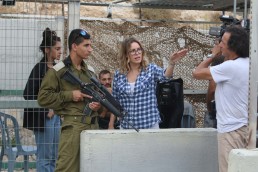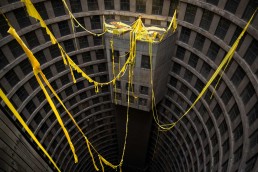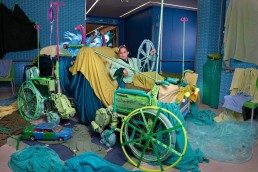Features | By Hamdi Khalif
Two City alumnae refocus their lens on human rights
It is always a pleasure to catch up with City alumni, especially those who have dedicated their lives to the service of others. I spoke with Farah Al-Nabulsi and Elisa L. Iannacone, two alumnae tackling human rights injustices head on, and through their work, they show us the power of a camera.
Farah Al-Nabulsi
Born to a Palestinian mother and Palestinian-Egyptian father, Farah Al-Nabulsi had always known about the Israeli-Palestinian conflict, but it was only after visiting Palestine as an adult that she was confronted by the true realities of what she, and several human rights organisations including Human Rights Watch and Amnesty International, refer to as an apartheid state. In 2013, Farah saw more than she bargained for: a mother who lost her 13-year-old son to military prison, a family sifting through the ruins of their demolished home, queues of people held at checkpoints just so they can fulfil their daily activities. Meanwhile, looming in the hilltops, illegal settlements in the West Bank boasted their superiority. The injustice was stark. Later, checkpoints would become the focus of Farah’s Oscar-nominated and Bafta- winning short film, The Present.

It follows a day in the life of Yusef who goes into town to buy his wife a gift for their anniversary. With him is his young daughter, Yasmine. What would take most of us only an hour or so, at most, takes Yusef and his daughter an entire day because of myriad checkpoints. Checkpoints that serve a two-tier system, one for Israelis and another for Palestinians. It is harrowing to watch, let alone to live with. The constant restrictions the Palestinian people face are brought to the fore in The Present. When I asked why she chose to focus on the humiliation of Palestinians as opposed to the bullets, bombs and burning buildings we have become familiar with through media reports, Farah tells me: “As a filmmaker, you must go where your creativity takes you”.
“The initial idea of the story came to me from my own experiences at Israeli checkpoints, watching other Palestinians held up and processed through them and a real conversation I had with a friend in Palestine in front of a checkpoint he had to go through every day – sometimes numerous times a day.”
While the concept of The Present is relatively simple, its impact is anything but. It homes in on how the ordinary and the the everyday can become suffocating for Palestinians. We, in turn, as onlookers, are forced to reckon with our own privilege. By reframing the Palestinian narrative in this way, Farah helps us to appreciate how Palestinians are stripped of the daily freedoms we take for granted.
Film is Farah’s medium of choice to help shed light on human rights issues. Today, she is a BAFTA-winning filmmaker or in her words “a purpose-driven film director, writer and producer”, but this was not always the case. In 1996, Farah graduated with BSc in Investment and Insurance from Bayes Business School (formerly Cass Business School). She then embarked on a successful career in investment banking before co-founding and running, a for-profit business for 10 years. But it was after visiting Palestine, a trip that left her with a “deep sense of hopelessness and helplessness verging on depression” that Farah found her calling. Since then, her camera has been attempting to capture the horror and humiliation that she herself witnessed in Palestine.
Though Farah did not have previous training in filmmaking, she nevertheless threw herself into the deep end: she made a film. So in essence, Farah’s first step into cinematography was an act of courage, no doubt that same courage that drives her to tackle such a sensitive and frequently divided issue.
Farah believes that creativity can get to the heart of an issue, especially where other outlets miss the mark. She says: “Film is one of the most powerful modes of meaningful human communication. Film can tear down stereotypes and overcome misperceptions and misconceptions. I believe it is also one of the few tools left for Palestinians to tell their truth, their narrative to the outside world and make those human rights violations known”.
The Present is now streaming on Netflix.
Elisa L. Iannacone
Multimedia creator Elisa L. Iannacone’s work is centred on trauma but you would not be able to tell this from her cheery demeanour. “I do not think I came to these topics necessarily out of choice” she tells me, “it was more like I had certain experiences of trauma that drew me to these topics”.

Elisa, who graduated from City with MA International Journalism (Conflict Reporting) in 2013, had her life redirected after she was raped by her cousin in her hometown in Mexico. It is important to Elisa that we use the term rape, and not its more politically correct alternatives such as sexual assault or sexual violence. This came into contention when she embarked on her first project, The Spiral of Containment: Rape’s Aftermath, a photobook featuring 24 rape survivors from around the world. Elisa does not refer to the survivors by name but rather by a dedicated colour, and each survivor is represented by a conceptually curated photo.

The Spiral of Containment was purely a passion project, Elisa set out to give other survivors of rape agency over their own narratives. It was also wholly self-funded, not because Elisa did not try to attain funding, but because funders were uncomfortable with the word ‘rape’ in a pre #MeToo world. They instead suggested that the title of the collection be changed to something along the lines of ‘an exploration of sexual violence’ but Elisa was adamant, that something so common, however unfortunate, be referred to by the correct terminology.
Since The Spiral of Containment, Elisa has been busy. After all, human rights violations are a daily occurrence. When asked how she would describe her work, she says “I focus on creating work that reframes views on social issues or human rights, topics that we have heard of a thousand times. I try to find new ways to address them.”
Her recent work with the Nelson Mandela Children’s Hospital achieves exactly this, where she lets children with chronic conditions run wild with their imaginations. She then captures this in a single photo. “They do not have to say much, you can see it in their eyes and know they feel like celebrities. And in that moment, anything is possible” Elisa says.

Elisa fondly remembers City, in particular Professor John Owen who she describes as “an absolute wealth of knowledge”. Through attending his lectures, she felt inspired to pick up her camera and make a difference. “That is what he was trying to plant. He wanted us to do great things” she says. Elisa also feels that her Master’s at City equipped her with the journalistic tools to sensitively engage with her subjects, but the nature of her work also makes her approach entirely different from that of a typical journalist. “When you arrive in a moment of trauma with a camera and capture someone in their most vulnerable instance, you are not giving them the chance to decide how their stories are told”, she tells me, referring to modern media. Elisa believes this approach to be inhumane, and through her work, she aims to achieve the opposite: to give dignity to her subjects and not take it away, which is often the case with today’s sensationalised nature of reporting.
You can follow Elisa’s work @elisaiannacone, www.elisaiannacone.com or www.reframehouse.com.
If you’ve been affected by any of the issues raised in this story, the following websites offer advice and support: Rape Crisis, NHS and Metropolitan Police. Students can also use You Report, We Support to report issues in confidence. Details of other student support services are here.